CNN
—
On one side of the pitch was a team made up some of the biggest names in world soccer. On the other was a grave digger, a dishwasher and a postman. The result seemed a formality.
However, in front of approximately 10,000 fans – and one intrepid US reporter – in Belo Horizonte, Brazil, one of soccer’s biggest ever upsets took place.
Described as a “real bunch of ragamuffins” by the author Geoffrey Douglas, the US beat a star-studded England side 1-0 at the 1950 World Cup.
Joe Gaetjens’ glancing header near the end of the first half was enough to secure the famous win for the US, a team made up of semi-professional players. But, given the lack of interest in the sport in the country at the time, it barely made a blip on people’s radar.
Many US outlets chose not to run reports of the game, with just one reporter, Dent McSkimmings, going to Brazil off his own back.
And for US soccer historian Steve Holroyd, the result was akin to the ‘Miracle on Ice’ from the 1980 Winter Olympics when the American team stunned the mighty Soviet Union in Lake Placid.
“With the exception of the politics, this was that. I mean, a plucky group of underdogs just beat what was generally universally recognized as the best team in the world,” Holroyd told CNN Sport.
“You would think they would be the type of story that Americans would love to champion. In a different universe with the Internet – if the Internet existed then – maybe that would have been the very thing to drag soccer out of the ethnic enclaves and onto the national sports consciousness.
“But the papers didn’t pick it up, it didn’t get the coverage, it had zero impact, sad to say, on the growth or anything of the game in this country at any level.”
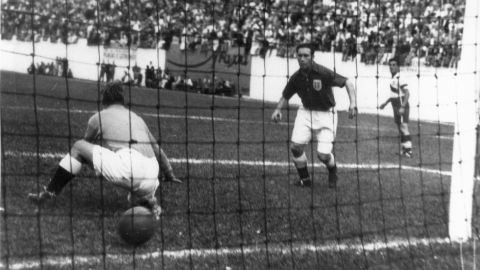
Though soccer in the US may have not been as popular as other sports, it had a long history in the country, dating back to the 1920s.
At a time when other major leagues in the US were professionalizing, soccer also attempted a professional football league.
Although the American Soccer League was “wiped out” by the economic depression that wrecked the country in the 1920s, according to Holroyd, it was the first example of a soccer league which relied on corporate sponsorship.
After the failure of the American Soccer League, the sport “largely retreated into the ethnic enclaves,” Holroyd explained.
“It is very much seen as a sport for immigrants, played exclusively by immigrants,” he said.
“The teams that popped up when the second American Soccer League formed in 1933, no longer did you have like the more neutral names you would expect to find on these shores, like Pawtucket Rangers or Newark Skeeters, now it was Kearny Scots, Kearny Irish, Philadelphia Germans.”
Although there was a brief resurgence for the sport during and after the Second World War, it was played in small pockets of the country – such as St. Louis, Missouri.
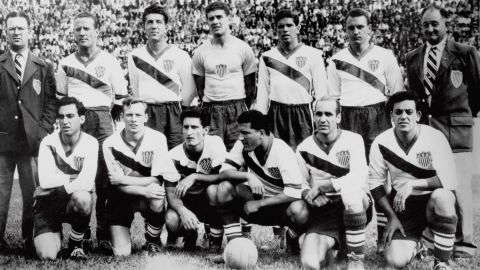
And so when the 1950 World Cup approached, there was little national interest or coverage of the US’ participation. It was down to the United States Soccer Football Association – who, Holroyd explains, most likely only had one permanent member of staff – to put together a team to compete against the footballing superpowers of Europe and South America.
The team that was selected was a “hodgepodge,” said Douglas, selected from all across the US. Most had never met – let alone played with each other – apart from four who played in St. Louis.
To reach the finals of the World Cup in 1950, the US had to progress through a three-team qualification group, alongside Mexico and Cuba.
Mexico – a country with a footballing heritage – finished unbeaten with four wins from four, while the US qualified by the skin of its teeth thanks to a 5-2 win against Cuba.
Even then, hopes were low. “So they went down there mostly on a lark. They just figured they get some time off from work. They didn’t know what the World Cup was, really,” Douglas said.
On the other side of the pond, hopes were sky high for a star-studded England team. The team was making its first appearance at a World Cup having chosen not to appear in the previous three.
“England passed on the first three World Cups because they figured: ‘We’re bigger than this, we’re already the champions, we don’t need to prove ourselves.’ They finally deigned to participate, this was going to be their coronation,” Holroyd said.
Filled with players who would go onto be regarded as greats – Stanley Matthews, Tom Finney and Stan Mortensen – the England squad were expected to do well.
They were in for quite a shock.
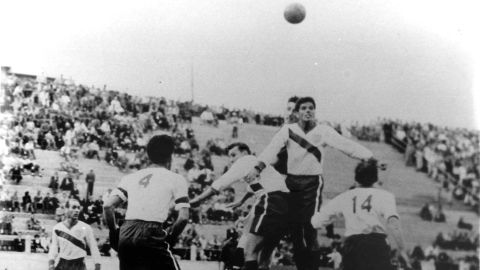
When Douglas spoke to some of the members of the US team for his book on the match, they talked of sensing overconfidence from their English counterparts.
The teams had played each other earlier in the year, with an England reserve team still comfortably beating the Americans. But the game at the Estádio Independência in Belo Horizonte was different.
“Stanley Matthews was their main player and he wasn’t playing because they were resting him for the next opponent. But they didn’t even play (their best players) because they thought America would be such an easy game,” Douglas said.
“And so when the English took the field, in the first half especially, they were very loose and making jokes.”
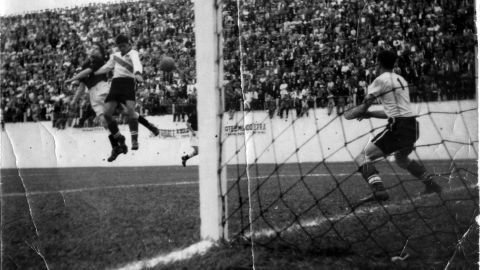
When the game got underway, unsurprisingly it was the English team who dominated. US goalkeeper Frank Borghi – an undertaker – was described as having the game of his life that day.
In the 37th minute, the game flipped on its head. Walter Bahr’s cross cannoned in off the side of Gaetjens’ – a dishwasher from New York – head and past the despairing Bert Williams in goal.
And just like that, the pressure was all on England. “By the end of the first half when Gaetjens scored, everybody sort of panicked,” Douglas said.
“And then apparently (England) pressed a little too hard, according to the guys on the US team. In the second half, (England) kind of got disorganized because they just couldn’t quite believe this was happening.”
Between Borghi’s countless saves, some wayward finishing from England and some heroic defending, the US’ lead remained intact as they recorded a famous victory, and one that has gone down in footballing history.
However, to the players on the US team, the American public back home and future generations, it’s a result that’s been somewhat lost to the sands of time.
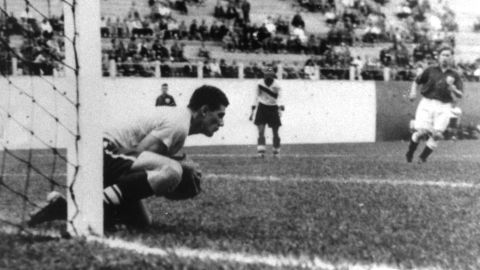
Even in the immediate aftermath of the win, the momentousness of what they had achieved didn’t hit the American players straightaway.
“So when they beat England, they thought: ‘Oh, that’s pretty cool. That’s pretty great. Let’s get on to the really important games back in St. Louis against Ford Motors,” Douglas said.
And despite the magnitude of the result, there wasn’t much by the way of international coverage. With McSkimmings the only reporter at the game – whose report appeared in the St. Louis Post-Dispatch – many outlets deemed the story not worth covering.
“The World Cup in 1950 was not a blip on the American sports radar,” Holroyd said. “If there was any interest at all, it was the immigrant communities looking to see how the motherland was doing. No one was rooting for the US.”
Such was the level of disinterest, when the victorious players returned home they were greeted by just their families. “Today, it would be a ticker tape parade. It would be huge,” Douglas said.
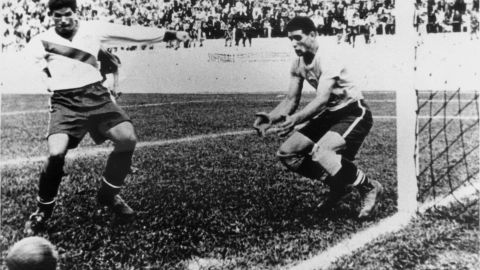
This could have been a seismic moment for the sport in the US, but given the paucity of the coverage, it went by without a murmur – until around 30 years later when players began receiving calls from journalists every four years, ahead of World Cups, to retell their tales.
There was huge shame in England about the result at being toppled by the upstart US team. Douglas detailed a newspaper bordering their paper with black to highlight the ignominy.
“They were embarrassed that they were beaten by this team of nobodies from a country that didn’t register on the soccer scale,” Douglas said.
For the victorious team, the “Cinderella” nature of the win has been commemorated since, with all members of the winning US team inducted into the United States Soccer Hall of Fame in 1976.
And while football is inundated with shocks and underdog stories, Holroyd believes it is the “biggest upset on the biggest of world stages ever.”
The disparity between the 2022 editions of the US and English teams at this year’s World Cup isn’t as much as in 1950. But 72 years later, Christian Pulisic and Weston McKennie could do worse than channeling the spirit of Bahr and Gaetjens when they line up against England in Qatar.
Stay connected with us on social media platform for instant update click here to join our Twitter, & Facebook
We are now on Telegram. Click here to join our channel (@TechiUpdate) and stay updated with the latest Technology headlines.
For all the latest Sports News Click Here
